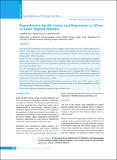Please use this identifier to cite or link to this item:
https://hdl.handle.net/20.500.14356/1404Full metadata record
| DC Field | Value | Language |
|---|---|---|
| dc.contributor.author | Aryal, Shreyashi | - |
| dc.contributor.author | Shrestha, Deepak | - |
| dc.contributor.author | Pant, Sagun Ballav | - |
| dc.date.accessioned | 2023-05-10T06:21:26Z | - |
| dc.date.available | 2023-05-10T06:21:26Z | - |
| dc.date.issued | 2019 | - |
| dc.identifier.citation | AryalS., ShresthaD., & PantS. B. (2019). Reproductive Health Issues and Depression in Wives of Labor Migrant Workers. Journal of Nepal Health Research Council, 17(3), 308-314. https://doi.org/10.33314/jnhrc.v17i3.1817 | en_US |
| dc.identifier.issn | Print ISSN: 1727-5482; Online ISSN: 1999-6217 | - |
| dc.identifier.uri | http://103.69.126.140:8080/handle/20.500.14356/1404 | - |
| dc.description | Original Article | en_US |
| dc.description.abstract | Abstract Background: Young Nepalese men have been forced to migrate to other countries in search of better opportunities. Wives of these migrant workers are in a vulnerable state and face various problems. The aim of this study wasto assess the prevalence of reproductive health problems and depression in this sub-population and to compare it with women living together with their husbands. Methods: This is a hospital based case control study where depression and reproductive health problems including gender based violence were compared between wives of migrant workers and women living with their husbands. Structured questionnaire was used to assess reproductive symptomatology and Becks depression Inventory-II was used to measure level of depression. Results: During the study period, 38.65% (2193) of all women were wives of migrant workers. India was the country where most 34.6% (73) men migrated. Mean duration of migration was 51.96 months (SD= 63.27). Moderate to severe depression was present in 42.6% (90) of wives of migrant workers and 80.09% of these women experienced some form of gender based violence. Reproductive tract symptoms and gender based violence and depression were significantly more present in these women (p<0.000). Conclusions: Depression and reproductive health problems weremore prevalent in wives of labor migrant workers than in women living with their husbands. The physical and mental health needs of this sub-population warrants screening strategies and preventive measures. Keywords: Depression; reproductive symptoms; migrant workers; wives. | en_US |
| dc.language.iso | en | en_US |
| dc.publisher | Nepal Health Research Council | en_US |
| dc.relation.ispartofseries | July-Sep, 2019;1817 | - |
| dc.subject | Depression | en_US |
| dc.subject | Reproductive symptoms | en_US |
| dc.subject | Migrant workers | en_US |
| dc.subject | Wives | en_US |
| dc.title | Reproductive Health Issues and Depression in Wives of Labor Migrant Workers | en_US |
| dc.type | Journal Article | en_US |
| local.journal.category | Original Article | - |
| Appears in Collections: | Vol. 17 No. 3 Issue 44 Jul-Sep 2019 | |
Files in This Item:
| File | Description | Size | Format | |
|---|---|---|---|---|
| 1817-Manuscript-12201-1-10-20191114.pdf | Fulltext Download | 264.07 kB | Adobe PDF |  View/Open |
Items in DSpace are protected by copyright, with all rights reserved, unless otherwise indicated.
